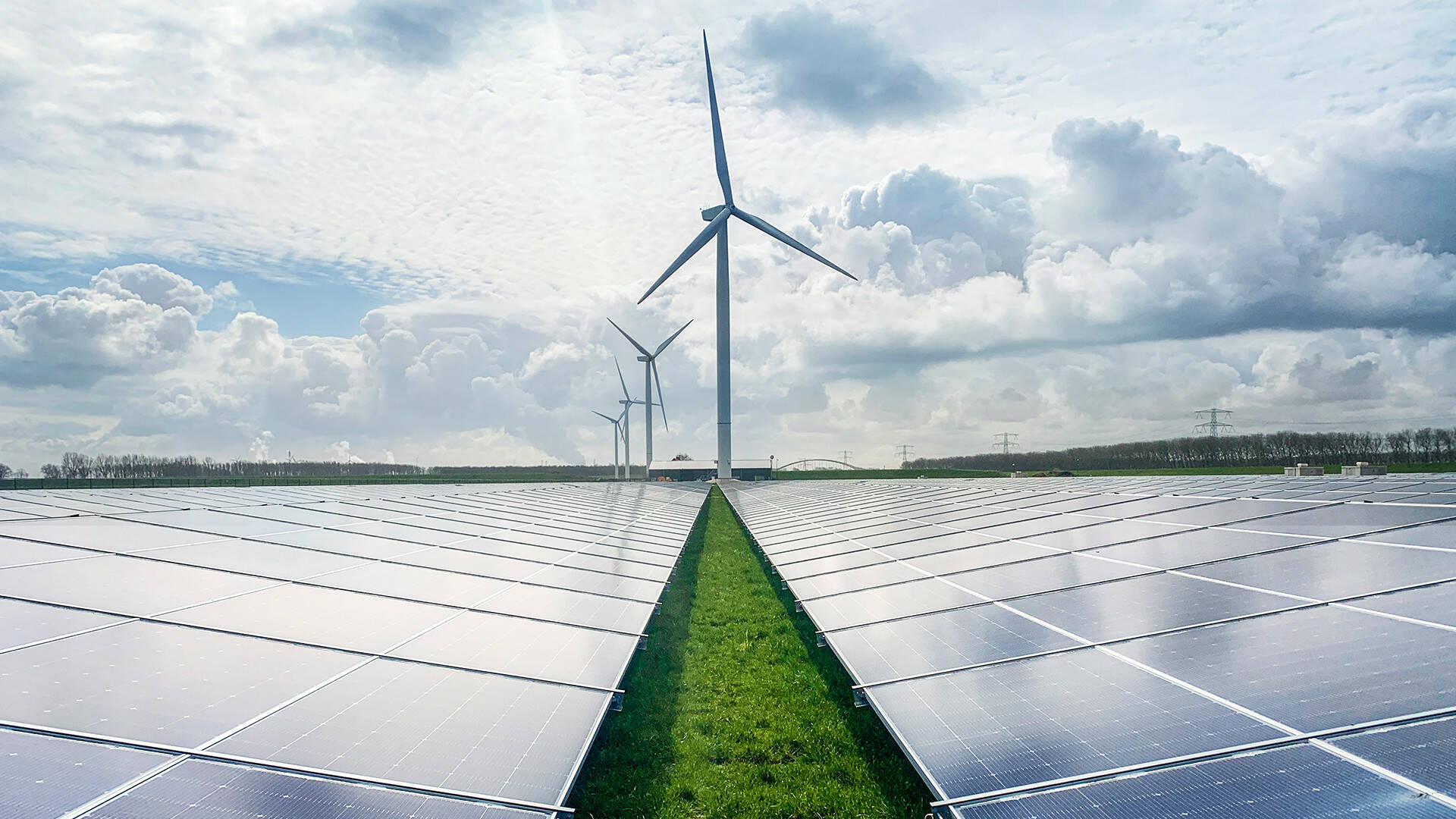
Shell, on its journey to net zero by 2050
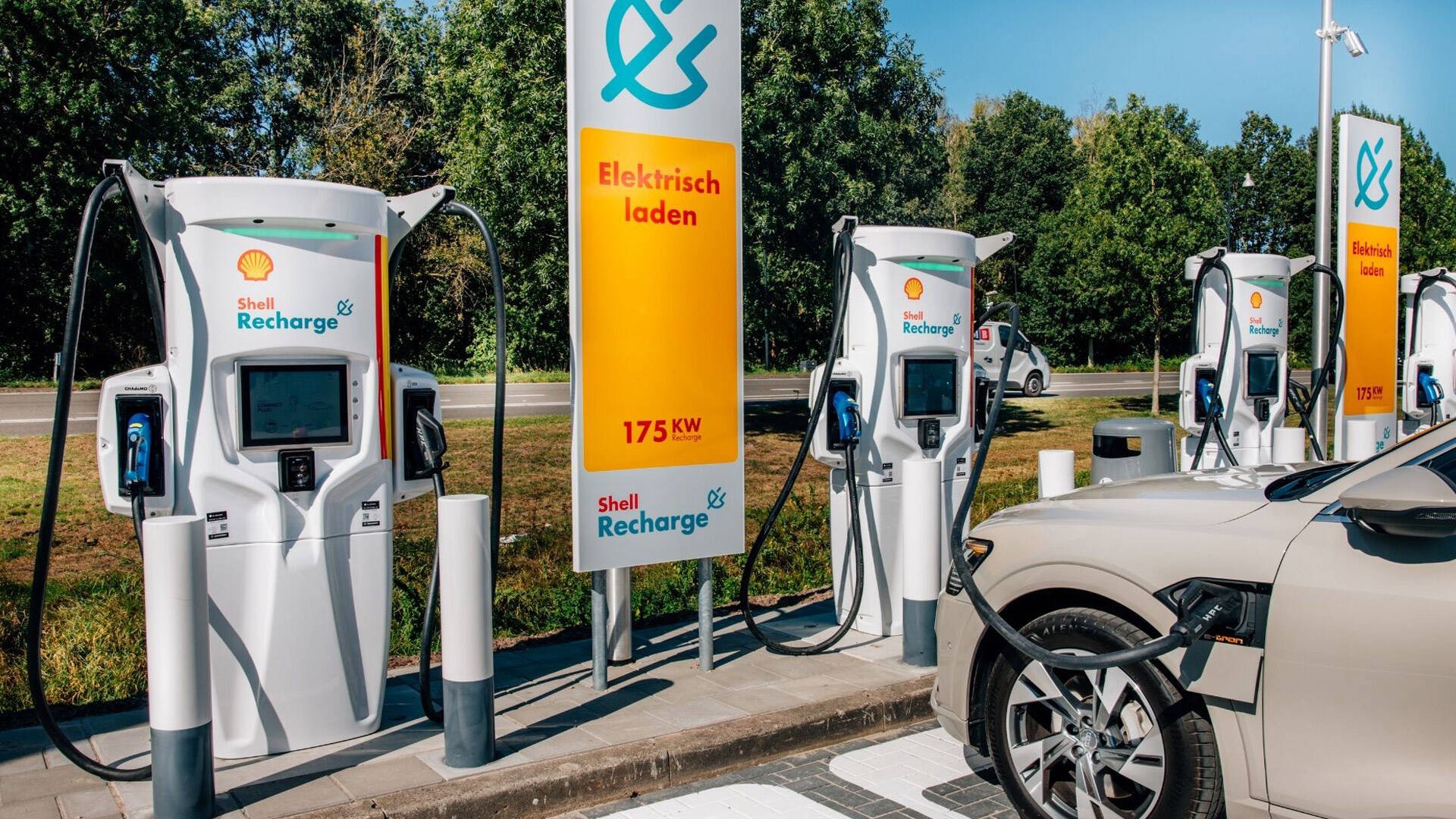


Go to next article

Go back
scroll down

Shell works with Alfen because we strive for high quality and Alfen offers that, alongside innovation. Alfen is a great Dutch success story and, as it continues to spread its wings, it might offer opportunities to extend our collaboration. As I said, the transformation required will only be delivered by collaboration, innovation and shared learning and that’s how we work together.
Can you reflect on the relationship with Alfen?
Alfen’s battery is integrated with two ultra-fast 175kW chargers at our Zaltbommel forecourt in the Netherlands. We are trialling the solution as an alternative or add-on to grid upgrade which can be costly and time-consuming. The battery stores energy and powers the chargers directly so that they can still operate simultaneously, even if the grid connection has reached its capacity.
It could be that the battery becomes an alternative to grid upgrade or a temporary solution until the grid upgrade takes place. We are also testing what else we can do with the battery, for example, by using dynamic load balancing to charge multiple vehicles at optimum charging speeds. The battery is connected to a Virtual Power Plant and so an additional benefit is that any spare capacity can be sold back to the grid in periods of peak demand which generates extra revenue for the site. In the same way, because we are always looking for new revenue models, using a fleet of batteries to provide grid stabilisation services could become a regular revenue stream for us.
Charge point availability is key to the mass uptake of EVs and this trial project helps address some of the associated infrastructure challenges. It could also serve as a blueprint for Shell’s future installation activities.
Can you tell us about the Shell/Alfen battery powered ultra-fast charging pilot project?
Can you give your view on the e-mobility market and related opportunities and challenges?
The window of opportunity for becoming a market leader in e-mobility is just a few years in my view and so it is key to understand very quickly what new value chains look like and how we can develop them efficiently. This requires us to know more than anyone else about the needs of e-mobility users and define where exactly we need to be competitive in the value chain in order to win business. Collaboration is also really important so we need to think carefully about the right partners to work with so we can find smart energy solutions together and innovate, experiment, extend our knowledge and, ultimately, scale up.
The entire mobility ecosystem is going to change. Ownership of passenger cars is already decreasing in cities in favour of shared mobility i.e., car sharing or e-hailing, and this will continue. It is already happening very quickly in Asia and it will accelerate here too. In the future, autonomous vehicles could really change the landscape and we need to understand what that landscape looks like, between now and then, so we know where to install charging nodes or hubs, who we need to partner with, what digital platform we should use – all based around the needs of people travelling to make it convenient and simple. While we clearly have a strategic direction, fleshing it out will be an ongoing project and we will have to remain eager to learn and experiment.
“ The transformation required will only be delivered by collaboration, innovation and shared learning ”
Can you tell us more about Shell’s zero emission strategy and the role of e-mobility?
Our global ‘Powering Progress’ strategy was followed by specific goals for Shell in the Netherlands. One of the commitments is to make all fuel for transport in the Netherlands carbon neutral by 2040 and electrification is
a large part of that.
We currently have more than 80 locations in the Netherlands with fast chargers, most of them faster than 150kW, with a target of 250 locations by 2025 - but we will probably achieve it as early as next year. Our strategy is to create larger charging plazas at strategic locations rather than install chargers at each existing station. We are also working on facilitating destination charging, for example, at supermarkets and shopping centres. As part of this, we have signed a contract with European parking operator, QPark, to install both 22kW and fast chargers at multiple of its locations.
We are also involved in certain urban developments, where we supply energy using solar and battery technologies and then install charging infrastructure and take the Charge Point Operator role. By 2025, we aim to deliver and manage 500,000 charge points worldwide and so we are continuously expanding our EV organisation.
Can you introduce yourself and tell us about your role?
I am currently responsible for Shell’s fuel stations, or perhaps it’s better to call them service stations, in the Netherlands, Belgium, Luxembourg and France – there are about 1000 in my area. Traditionally, these were all petrol stations, but we now need to diversify as we move away from dependence on fossil fuel. We have two approaches to doing this. The first is to expand the non-fuel retail offering at the stations, so the shopping and catering elements. We have already had success in this area, for example, in France it accounts for 70% of the turnover and, in the Netherlands, about 50%. We have achieved this by responding to modern trends, for example, by supplying better coffee and healthy snacks because demand for those things has grown, particularly amongst younger generations, who are increasingly buying food and drink outside the home. No need to worry though, we will always still sell chocolate!
Our second approach to diversification is to make fuel more sustainable through inclusion of EV charging, hydrogen, liquefied natural gas and biofuels. We already offer EV charging but we need to add more, and better accommodate the difference in EV driver usage profile which includes a longer stay (10 – 30 minutes) than a traditional driver (5 – 10 minutes). The time difference provides potential opportunities, for example, we just opened a new concept station on the A16 motorway in the Netherlands which recognises different driver needs by offering a fast area, for people that want to fuel and go, and a slow area, for people who also want to shop or eat. At the moment, most EV drivers quickly top up fuel and go in order to reach their destination quickly but that may change in future, with us perhaps offering a free coffee or other retail incentives to people who charge regularly with us. As I mentioned earlier, we also see a strong future for hydrogen, particularly as a heavy vehicle fuel and we are watching how electrification pans out, in order to understand any impact that may have on the future of hydrogen. We have been working with LNG for years, which is 22% better than diesel in terms of CO2 and are just starting to work with bio-LNG. We also use biofuels and blend them with petrol and diesel.
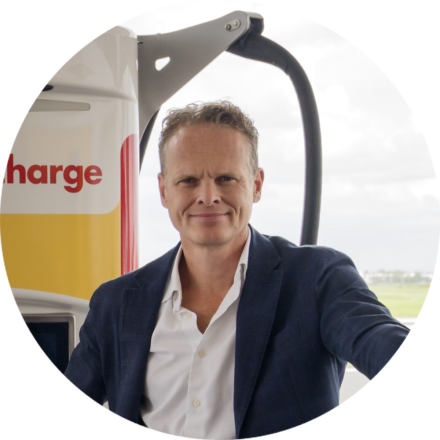
An interview with Hilmar van den Dool General Manager Shell Mobility /
Retail Benelux & France
Global energy giant, Shell, has over 80,000 employees in more than 70 countries and is the fifth largest company in the world by 2020 revenues. Having been firmly grounded in the oil and gas industry for over a century, with activities in every area including exploration, production, refining, distribution, generation and sales, defining a net zero strategy might seem like an almost impossible task but, earlier this year, Shell did exactly that. Its global ‘Powering Progress’ strategy builds on the progress the group has already made in areas such as clean energy and e-mobility but goes much further, by setting out its ambition to be a net zero emissions business by 2050. The strategy encompasses short and medium-term carbon intensity goals related to both the energy it sells, as well as produces, and clarity about how, and who, it will work with differently to achieve its milestones and ultimate goal – and all with a view to full alignment with the Paris Agreement.
With huge transformation obviously on the way, we spoke to Hilmar van den Dool. Currently in charge of Shell’s retail activities i.e., fuel stations in Benelux and France, he is about to go through a transformation of his own, to become General Manager of e-mobility and decarbonisation at Shell, globally. Here is his view on the changes at Shell and its e-mobility plans.
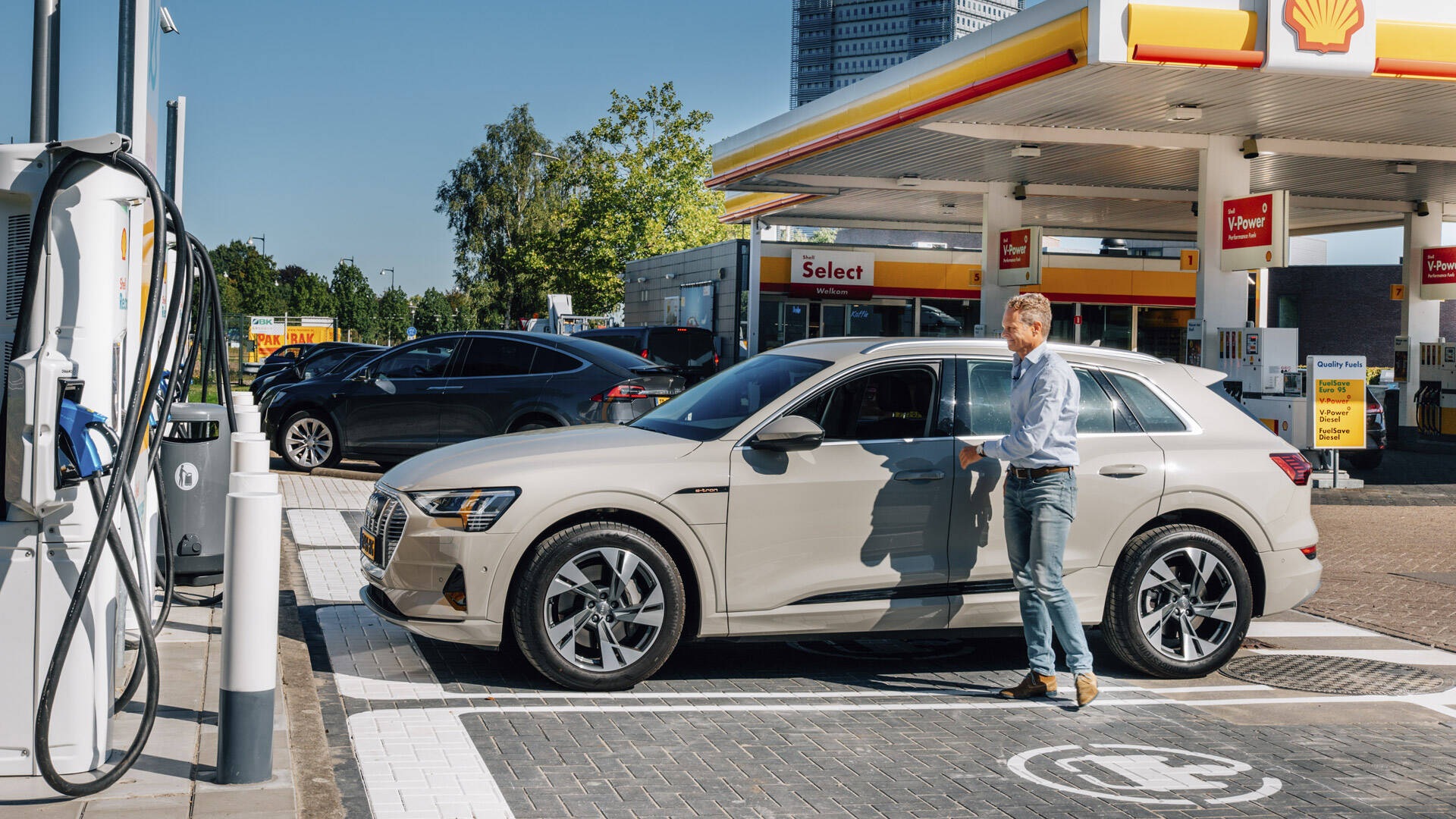

Shell, on its journey to net zero by 2050



Go to next article

Go back
Shell works with Alfen because we strive for high quality and Alfen offers that, alongside innovation. Alfen is a great Dutch success story and, as it continues to spread its wings, it might offer opportunities to extend our collaboration. As I said, the transformation required will only be delivered by collaboration, innovation and shared learning and that’s how we work together.
Can you reflect on the relationship with Alfen?
Alfen’s battery is integrated with two ultra-fast 175kW chargers at our Zaltbommel forecourt in the Netherlands. We are trialling the solution as an alternative or add-on to grid upgrade which can be costly and time-consuming. The battery stores energy and powers the chargers directly so that they can still operate simultaneously, even if the grid connection has reached its capacity.
It could be that the battery becomes an alternative to grid upgrade or a temporary solution until the grid upgrade takes place. We are also testing what else we can do with the battery, for example, by using dynamic load balancing to charge multiple vehicles at optimum charging speeds. The battery is connected to a Virtual Power Plant and so an additional benefit is that any spare capacity can be sold back to the grid in periods of peak demand which generates extra revenue for the site. In the same way, because we are always looking for new revenue models, using a fleet of batteries to provide grid stabilisation services could become a regular revenue stream for us.
Charge point availability is key to the mass uptake of EVs and this trial project helps address some of the associated infrastructure challenges. It could also serve as a blueprint for Shell’s future installation activities.
Can you tell us about the Shell/Alfen battery powered ultra-fast charging pilot project?
Can you give your view on the e-mobility market and related opportunities and challenges?
The window of opportunity for becoming a market leader in e-mobility is just a few years in my view and so it is key to understand very quickly what new value chains look like and how we can develop them efficiently. This requires us to know more than anyone else about the needs of e-mobility users and define where exactly we need to be competitive in the value chain in order to win business. Collaboration is also really important so we need to think carefully about the right partners to work with so we can find smart energy solutions together and innovate, experiment, extend our knowledge and, ultimately, scale up.
The entire mobility ecosystem is going to change. Ownership of passenger cars is already decreasing in cities in favour of shared mobility i.e., car sharing or e-hailing, and this will continue. It is already happening very quickly in Asia and it will accelerate here too. In the future, autonomous vehicles could really change the landscape and we need to understand what that landscape looks like, between now and then, so we know where to install charging nodes or hubs, who we need to partner with, what digital platform we should use – all based around the needs of people travelling to make it convenient and simple. While we clearly have a strategic direction, fleshing it out will be an ongoing project and we will have to remain eager to learn and experiment.

“ The transformation required will only be delivered by collaboration, innovation and shared learning ”
Can you tell us more about Shell’s zero emission strategy and the role of e-mobility?
Our global ‘Powering Progress’ strategy was followed by specific goals for Shell in the Netherlands. One of the commitments is to make all fuel for transport in the Netherlands carbon neutral by 2040 and electrification is a large part of that.
We currently have more than 80 locations in the Netherlands with fast chargers, most of them faster than 150kW, with a target of 250 locations by 2025 - but we will probably achieve it as early as next year. Our strategy is to create larger charging plazas at strategic locations rather than install chargers at each existing station. We are also working on facilitating destination charging, for example, at supermarkets and shopping centres. As part of this, we have signed a contract with European parking operator, QPark, to install both 22kW and fast chargers at multiple of its locations.
We are also involved in certain urban developments, where we supply energy using solar and battery technologies and then install charging infrastructure and take the Charge Point Operator role. By 2025, we aim to deliver and manage 500,000 charge points worldwide and so we are continuously expanding our EV organisation.
Can you introduce yourself and tell us about your role?
I am currently responsible for Shell’s fuel stations, or perhaps it’s better to call them service stations, in the Netherlands, Belgium, Luxembourg and France – there are about 1000 in my area. Traditionally, these were all petrol stations, but we now need to diversify as we move away from dependence on fossil fuel. We have two approaches to doing this. The first is to expand the non-fuel retail offering at the stations, so the shopping and catering elements. We have already had success in this area, for example, in France it accounts for 70% of the turnover and, in the Netherlands, about 50%. We have achieved this by responding to modern trends, for example, by supplying better coffee and healthy snacks because demand for those things has grown, particularly amongst younger generations, who are increasingly buying food and drink outside the home. No need to worry though, we will always still sell chocolate!
Our second approach to diversification is to make fuel more sustainable through inclusion of EV charging, hydrogen, liquefied natural gas and biofuels. We already offer EV charging but we need to add more, and better accommodate the difference in EV driver usage profile which includes a longer stay (10 – 30 minutes) than a traditional driver (5 – 10 minutes). The time difference provides potential opportunities, for example, we just opened a new concept station on the A16 motorway in the Netherlands which recognises different driver needs by offering a fast area, for people that want to fuel and go, and a slow area, for people who also want to shop or eat. At the moment, most EV drivers quickly top up fuel and go in order to reach their destination quickly but that may change in future, with us perhaps offering a free coffee or other retail incentives to people who charge regularly with us. As I mentioned earlier, we also see a strong future for hydrogen, particularly as a heavy vehicle fuel and we are watching how electrification pans out, in order to understand any impact that may have on the future of hydrogen. We have been working with LNG for years, which is 22% better than diesel in terms of CO2 and are just starting to work with bio-LNG. We also use biofuels and blend them with petrol and diesel.
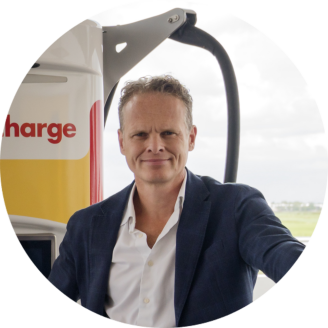
An interview with Hilmar van den Dool General Manager Shell Mobility /
Retail Benelux & France
Global energy giant, Shell, has over 80,000 employees in more than 70 countries and is the fifth largest company in the world by 2020 revenues. Having been firmly grounded in the oil and gas industry for over a century, with activities in every area including exploration, production, refining, distribution, generation and sales, defining a net zero strategy might seem like an almost impossible task but, earlier this year, Shell did exactly that. Its global ‘Powering Progress’ strategy builds on the progress the group has already made in areas such as clean energy and e-mobility but goes much further, by setting out its ambition to be a net zero emissions business by 2050. The strategy encompasses short and medium-term carbon intensity goals related to both the energy it sells, as well as produces, and clarity about how, and who, it will work with differently to achieve its milestones and ultimate goal – and all with a view to full alignment with the Paris Agreement.
With huge transformation obviously on the way, we spoke to Hilmar van den Dool. Currently in charge of Shell’s retail activities i.e., fuel stations in Benelux and France, he is about to go through a transformation of his own, to become General Manager of e-mobility and decarbonisation at Shell, globally. Here is his view on the changes at Shell and its e-mobility plans.




